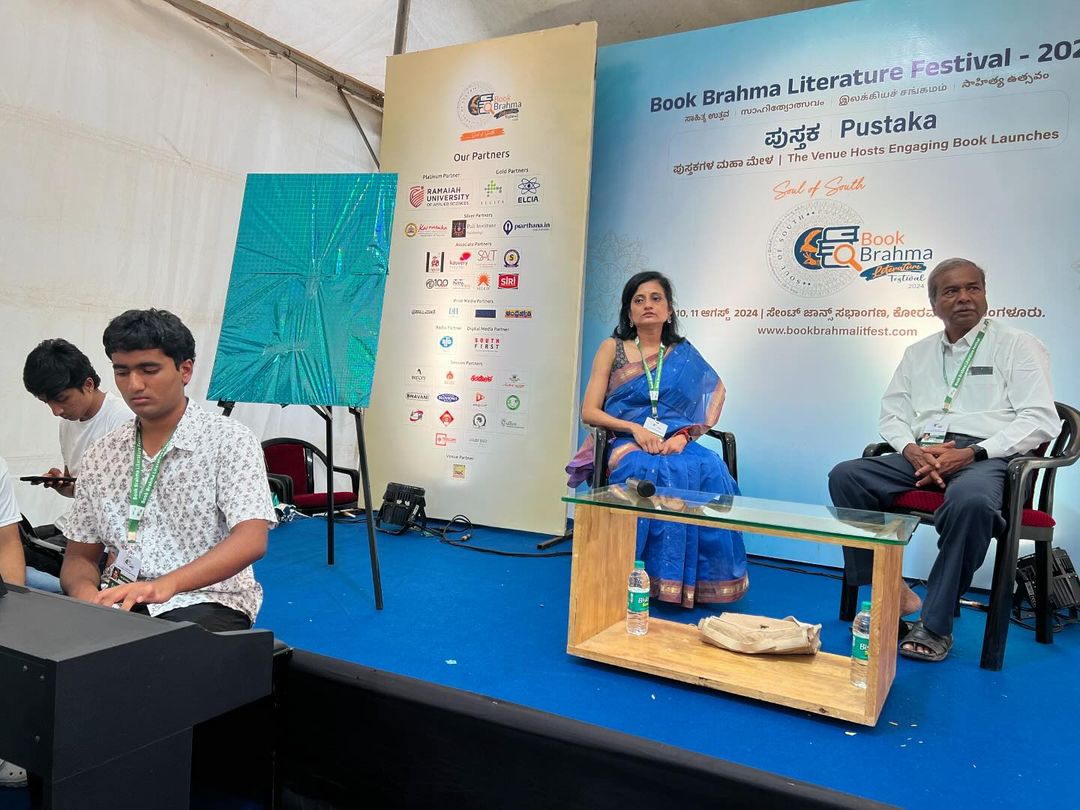Sena's novel “The 86th Village” is rooted in the ongoing Upper Krishna Dam project, which threatened to submerge 176 villages.
Published Aug 16, 2024 | 11:00 AM ⚊ Updated Aug 16, 2024 | 5:11 PM

Sena Desai Gopal and Surya Kartik Gopal on the keyboard. (Supplied)
One of the themes of Amitav Ghosh’s 2016 non-fiction book The Great Derangement was the inability of novelists to portray climate change in their works.
Ghosh dwelt on the enormous infrastructure development in areas of great ecological vulnerability, underlining the derangement that has now become the norm. At the 2024 Book Brahma Literature Festival in Bengaluru, novelist Sena Desai Gopal appeared to fill in the blank that Ghosh observed in novel writing, and spoke of her deep engagement with impending loss, through irrational development, as the plot of her novel “The 86th Village.”
The novel inspired her 18-year-old son Surya Kartik Gopal to compose a musical.
Sena Desai Gopal moved to the US 22 years ago, and her novel appeared in English in 2022; it was only recently translated into Kannada.
Sena’s novel “The 86th Village” is rooted in the ongoing Upper Krishna Dam project; by 2022, two stages of the project were declared completed.
The project threatened to submerge 176 villages, and the last village to drown, was the one the novel was based on, the 86th. “The title, suggested by my publisher, reflects this impending loss,” Sena told South First.
Sena has a background in science and medical journalism, and this work was originally intended to be non-fiction.
As she explored the mismanagement and corruption of the dam project, however, she found herself drawn to the form of the novel. “I realised my biases as a victim of this system, which led me to present the story through fiction, creating a backdrop for a compelling love story entwined with politics and climate issues,” she explained.
Sena was strongly connected to her ancestral village, Yadahalli, in Bagalkot district of northern Karnataka, despite having lived in the US for over two decades.
“I’ve visited India at least once a year, spending considerable time in Yadahalli. Eighteen generations of my family have called it home,” she said. “The dam project was a constant topic in our family discussions, so I was well-informed about its implications. My politically connected family also provided insights into the local situation.”
Sena hopes the Kannada translation will bring the book closer to those with a personal stake in the matter.

Sena’s novel “The 86th Village” is rooted in the ongoing Upper Krishna Dam project that threatens to submerge 176 villages. (Supplied)
Surya Kartik Gopal, Sena’s 18-year-old son, created a musical titled “The Children of the Swamp” inspired by his mother’s novel.
“I explored themes of political corruption and misogyny, setting them in an American context,” he explained.
The musical, with operatic elements, allowed Surya to bridge the cultural gap between his American upbringing and his Indian roots. “I’m pursuing music at university, with a multidisciplinary approach, combining history, writing, and composition.”
Through this mother-son duo, literature and music flow together demonstrating the enduring influence of familial and cultural ties, across continents.
As the dam project across the Krishna River proceeds, villages are displaced through submergence. The last village to drown, Nilgi, is the site where the novel is set. Nilgi has escaped the fate of neighbouring villages, and illegal mining and floods have not ravaged it; even so, as mining induced erosion sweeps out neighbouring mountains, the likelihood of catastrophic floods loom.
Central to the novel is the enigmatic arrival of Reshma, a young orphan girl whose sudden appearance in Nilgi upends the delicate balance of the village.
Her presence draws the attention of Raj Nayak, the village patriarch and leader of the anti-dam movement. For years, Raj has fought against the corrupt government, advocating for fair compensation for those whose lives are at stake. Reshma’s mysterious origins set off a cascade of revelations, exposing secrets and corruption in the village.
(Edited by Rosamma Thomas)
(South First is now on WhatsApp and Telegram)
